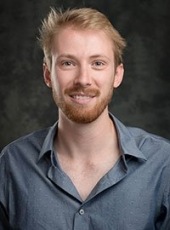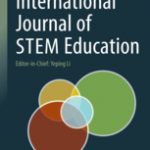 Drs. Dare and Ellis of the Teacher Education program in Cognitive and Learning Sciences have published new research in the International Journal of STEM Education. Along with their co-author, Dr. Gillian Roehrig at the University of Minnesota, Drs. Dare and Ellis explore middle school teachers’ experiences in their first-time implementation of integrated STEM curriculum units. This article is publicly available through Open Access.
Drs. Dare and Ellis of the Teacher Education program in Cognitive and Learning Sciences have published new research in the International Journal of STEM Education. Along with their co-author, Dr. Gillian Roehrig at the University of Minnesota, Drs. Dare and Ellis explore middle school teachers’ experiences in their first-time implementation of integrated STEM curriculum units. This article is publicly available through Open Access.
Michigan Technological University’s transdisciplinary researchers reach across disciplines and institutional boundaries to solve complex problems that are bigger than a single specialized field.
Kelly Steelman, an assistant professor of cognitive & learning sciences, says diversity is good for problem-solving. If you only have a spoon, the only food you’ll want to eat is soup.
“The more tools you have available to your research team, the more likely you are to consider a variety of solutions and not get stuck always trying to use the same approach to every problem… The more perspectives we bring to the table, the better opportunity we have to create innovative and transformative solutions.”
Read the full story on the Michigan Tech News Website.
Elizabeth Veinott, Associate Professor in Cognitive and Learning Sciences, along with graduate student Katy Roose, recently presented their games for learning paper in the beautiful city of Amsterdam, Netherlands. The paper, Roller coaster park manager by day problem solver by night: Effect of video game play on problem solving, was included at the CHI-Play conference.
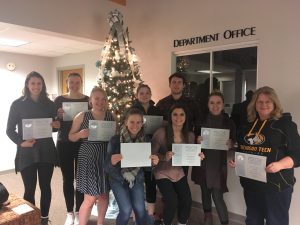 The Department of Cognitive and Learning Sciences inducted seven new members into Psi Chi, the International Honor Society in Psychology: Glory Creed, Elizabeth Kelliher, Abigail Kuehne, Mariah Sherman, Kay Tislar, Samantha Verran, and Kira Warner. The induction ceremony took place at the Harold Meese Center on Sunday, December 3. The Michigan Tech Chapter of Psi Chi is led by Halie Hart (President) and Caden Sumner (Treasurer) and advised by Dr. Kelly Steelman.
The Department of Cognitive and Learning Sciences inducted seven new members into Psi Chi, the International Honor Society in Psychology: Glory Creed, Elizabeth Kelliher, Abigail Kuehne, Mariah Sherman, Kay Tislar, Samantha Verran, and Kira Warner. The induction ceremony took place at the Harold Meese Center on Sunday, December 3. The Michigan Tech Chapter of Psi Chi is led by Halie Hart (President) and Caden Sumner (Treasurer) and advised by Dr. Kelly Steelman.
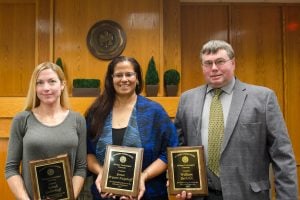 In Ceremonies held Oct. 21, Michigan Tech inducted three new members into the University’s Academy of Educators. The inductees included William Bertoldi, Sarah Geborkoff and Yoneé Bryant-Kuiphoff.
In Ceremonies held Oct. 21, Michigan Tech inducted three new members into the University’s Academy of Educators. The inductees included William Bertoldi, Sarah Geborkoff and Yoneé Bryant-Kuiphoff.
William Bertoldi graduated with a BS in Chemistry in 1980, with Secondary Teacher Certification in Chemistry and Mathematics. Bertoldi spent 30 years teaching in Kingsford Middle and High Schools. In 1996 he established a student organization called “Rockets for Schools,” for which he still serves as advisor. The group designs, builds and launches high-powered rockets. They have performed rocket launches at ceremonies nationally and have been featured in three commercials showcasing student work and have appeared on the Science Channel.
Of his induction into the Academy, Bertoldi says “It was a real honor to receive the award from Michigan Tech. It meant a lot to me and things were so very nice at the dinner. Michigan Tech gave me such a great education and was of such great help to me throughout my career.”
Sarah Gerborkoff, a science teacher at Houghton Middle School, earned a BS in Geology in 2000 with Secondary Teacher Certification in Earth Science and Science.
Since 2013 she has served at Houghton Middle School as the Lead Teacher for the Lake Superior Stewardship Initiative Project. On three different occasions, she served as the advisor for the Lexus Scholastic Eco Challenge team. Her 2014 team that focused on invasive species and her 2015 team that studies the remediation of stamp sands both won a $10,000 national prize.
Yoneé Bryant-Kuiphoff began her career as a science teacher at Milwood Magnet School in Kalamazo in 1993. She eventually became lead science teacher and assisted with staffing and curriculum for the new magnet school. A 1986 graduate of Cornerstone University, she received a master’s in Applied Science Education from Michigan Tech in 2014.
Since 2008 she has served as the Middle School Director for the Michigan Science Teachers Association. From 2011-14, as a member of the first cohort of the Michigan Teacher Excellence Project, Bryant-Kuiphoff participated in the collaboration of Michigan Tech and urban schools to improve Earth Science instructional practices.
Shari Stockero, director of teacher education, in the Department of Cognitive and Learning Sciences says the newest inductees are certainly due the recognition.
“These individuals have represented our program and Michigan Tech well. Teachers do not often receive the recognition they deserve, so we are honored to be able to present them with this acknowledgement of their contributions to K-12 education.”
The Academy of Educators gives public recognition to Michigan Tech alumni and alumnae who have brought distinction to themselves, Michigan Tech and the Teachers Education program through their participation, commitment, outstanding leadership and/or public service in the field of K-12 education.
Dr. Elizabeth Veinott and ACSHF graduate student Katy Roose presented “From Dragon Slayer to Problem Solver: Video Games as a Warm-Up for Problem Solving” at the Digital Media Learning Conference earlier this month. The conference was held at the University of California in Irvine, CA. To learn more about the conference, please visit: https://dml2017.dmlhub.net/
Eric Vasey (CS) presented a research paper, “Development and usability testing of a remote control app for an interactive robot” in the Computer Systems Technical Group and Maryam FakhrHosseini (CLS) presented “Robot theater with children for STEAM education” in the Children’s Issues Technical Group.
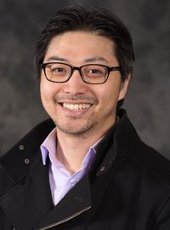 Myounghoon (Philart) Jeon (CLS/CS) and his three graduate students are attending the Human Factors and Ergonomics Society 2017 International Annual Meeting, which began October 9-13th, in Austin, Texas.
Myounghoon (Philart) Jeon (CLS/CS) and his three graduate students are attending the Human Factors and Ergonomics Society 2017 International Annual Meeting, which began October 9-13th, in Austin, Texas.
In addition, Jeon attended the International ACM Conference on Automotive User Interfaces and Interactive Vehicular Applications, held in Oldenburg, Germany, Sept 24-27th. For this year’s conference, Jeon chaired the video program, served as the international panel for the student doctoral colloquium, co-organized the Workshop on User-Centered Design for Automated Driving Systems and served as a chair for the Automated Driving session.
Jeon also presented two work-in-progress papers and one video at the conference:
- “Blueprint of the Auditory Interactions in Automated Vehicles: Report on the Workshop and Tutorial”
- “Eyes-free In-vehicle Air Gesture Controls: Auditory-only Displays Reduced Visual Distraction and Workload”
- “Design Process of Sonically-enhanced Air Gesture Controls in Vehicles”
